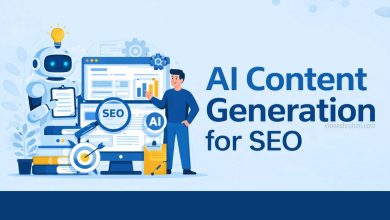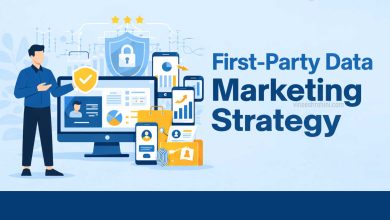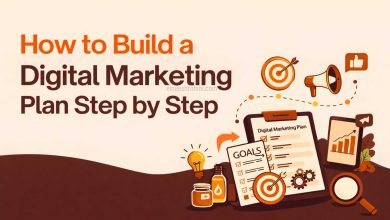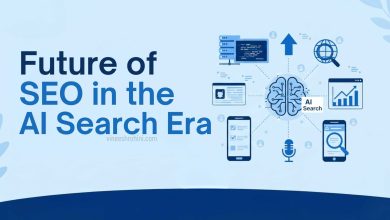The Basics of Digital Marketing: Comprehensive Guide 2025
Basics of Digital Marketing : In the modern era, where the internet has become an integral part of daily life, digital marketing has emerged as one of the most powerful tools for businesses to connect with their audience. Whether you’re a small startup or a multinational corporation, understanding the basics of digital marketing is essential to thrive in today’s competitive landscape.
Table of Contents
This essay delves into the fundamentals of digital marketing, its key components, and why it is crucial for businesses.
What is Digital Marketing?

Digital marketing refers to the use of digital channels, platforms, and strategies to promote products, services, or brands to a targeted audience. Unlike traditional marketing, which relies on mediums such as newspapers, television, and radio, digital marketing leverages the internet, social media, search engines, and other digital technologies to reach and engage consumers.
Also Read : Is Digital Marketing a Good Career ?
The primary goal of digital marketing is to create a meaningful connection with potential customers, build brand awareness, and ultimately drive sales and conversions. Its data-driven approach allows businesses to measure the effectiveness of campaigns in real-time and make informed decisions.
Key Components of Digital Marketing
Digital marketing encompasses a wide range of activities and channels. Here are some of the fundamental components:
1. Search Engine Optimization (SEO):
SEO is the practice of optimizing a website to rank higher on search engine results pages (SERPs). By improving a site’s visibility for relevant keywords, businesses can attract organic traffic and gain more exposure.
Key elements of SEO include:
- Keyword research
- On-page optimization (meta tags, headings, and content quality)
- Technical SEO (site speed, mobile-friendliness, and secure connections)
- Link building (acquiring backlinks from reputable websites)
2. Content Marketing:
Content marketing focuses on creating and distributing valuable, relevant, and consistent content to attract and retain a target audience. Examples include blog posts, videos, infographics, eBooks, and whitepapers.
High-quality content not only boosts SEO but also establishes a brand as an authority in its niche, fostering trust and loyalty among consumers.
3. Social Media Marketing:
Social media platforms like Fb, Insta, LinkedIn, Twitter, and TikTok have become essential for engaging with audiences. Social media marketing involves creating and sharing content, running ads, and interacting with followers to promote a brand and drive traffic to its website.
4. PPC Advertising:
PPC is a paid advertising model where businesses pay a fee each time someone taps on their ad. Google Ads, Bing Ads, and social media ads are common PPC platforms. PPC is highly targeted and offers immediate visibility, making it an effective strategy for driving traffic and generating leads.
5. Email Marketing:

Email marketing involves sending promotional messages, newsletters, or updates to a list of subscribers. It’s a cost-effective way to nurture relationships with customers, announce new products, and drive sales.
6. Affiliate Marketing:
In affiliate marketing, businesses partner with affiliates (individuals or other businesses) who promote their products in exchange for a commission on sales. This model is performance-based, meaning affiliates only earn when they deliver results.
7. Analytics and Data Measurement:
Digital marketing relies heavily on data. Tools like Google Analytics, Facebook Insights, and HubSpot allow businesses to track performance metrics, such as website traffic, conversion rates, and customer behavior. This data helps in refining strategies and achieving better results.
Benefits of Digital Marketing
- Global Reach: Digital marketing enables businesses to reach a global audience at a fraction of the cost of traditional marketing.
- Targeted Advertising: With digital marketing, businesses can target specific demographics, interests, and behaviors, ensuring their message reaches the right people.
- Cost-Effectiveness: Compared to traditional marketing, digital campaigns often require less investment and yield higher returns.
- Measurable Results: Real-time analytics allow businesses to monitor the performance of their campaigns and make data-driven decisions.
- Flexibility: Digital marketing strategies can be easily adjusted based on performance and market trends.
- Customer Engagement: Social media and other interactive channels allow brands to engage directly with customers, fostering stronger relationships.
Challenges in Digital Marketing
Despite its numerous advantages, digital marketing comes with challenges, such as:
- Constantly Evolving Trends: The digital landscape changes rapidly, requiring marketers to stay updated.
- High Competition: The ease of entry into digital marketing has led to increased competition, making it harder to stand out.
- Data Privacy Concerns: With stricter regulations like GDPR, businesses must ensure they handle customer data responsibly.
- Overwhelming Choices: The vast array of tools and platforms can be overwhelming, especially for beginners.
Basics of Digital Marketing – Conclusion :

Digital marketing is an indispensable tool for businesses in the modern era. By understanding its basics and leveraging its various components, companies can effectively reach their target audience, build brand loyalty, and drive growth. While it comes with its challenges, the benefits far outweigh the drawbacks, making it a must-have strategy for any business aiming to thrive in today’s digital-first world.
Buy Now : Professional Digital Marketing Course
As technology continues to evolve, so will digital marketing. Staying informed and adapting to new trends will be key for businesses and marketers to stay ahead of the curve and achieve sustained success.



